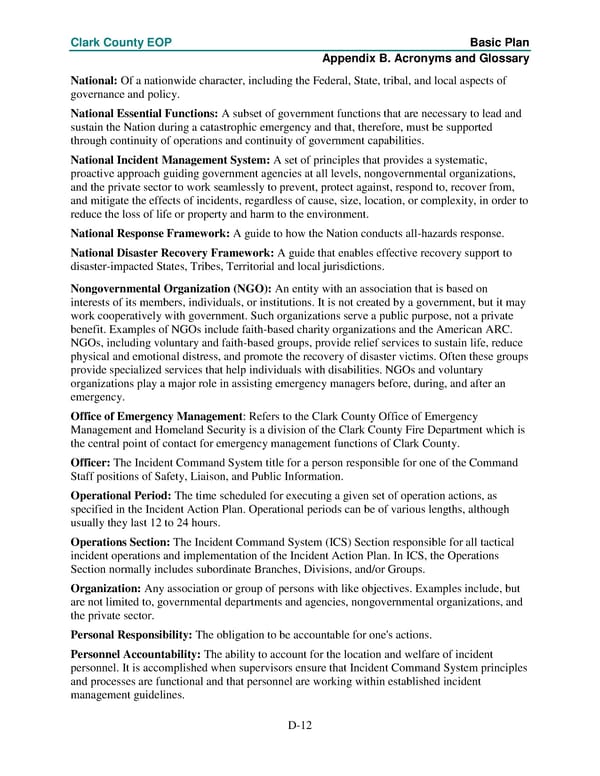Clark County EOP Basic Plan Appendix B. Acronyms and Glossary National: Of a nationwide character, including the Federal, State, tribal, and local aspects of governance and policy. National Essential Functions: A subset of government functions that are necessary to lead and sustain the Nation during a catastrophic emergency and that, therefore, must be supported through continuity of operations and continuity of government capabilities. National Incident Management System: A set of principles that provides a systematic, proactive approach guiding government agencies at all levels, nongovernmental organizations, and the private sector to work seamlessly to prevent, protect against, respond to, recover from, and mitigate the effects of incidents, regardless of cause, size, location, or complexity, in order to reduce the loss of life or property and harm to the environment. National Response Framework: A guide to how the Nation conducts all-hazards response. National Disaster Recovery Framework: A guide that enables effective recovery support to disaster-impacted States, Tribes, Territorial and local jurisdictions. Nongovernmental Organization (NGO): An entity with an association that is based on interests of its members, individuals, or institutions. It is not created by a government, but it may work cooperatively with government. Such organizations serve a public purpose, not a private benefit. Examples of NGOs include faith-based charity organizations and the American ARC. NGOs, including voluntary and faith-based groups, provide relief services to sustain life, reduce physical and emotional distress, and promote the recovery of disaster victims. Often these groups provide specialized services that help individuals with disabilities. NGOs and voluntary organizations play a major role in assisting emergency managers before, during, and after an emergency. Office of Emergency Management: Refers to the Clark County Office of Emergency Management and Homeland Security is a division of the Clark County Fire Department which is the central point of contact for emergency management functions of Clark County. Officer: The Incident Command System title for a person responsible for one of the Command Staff positions of Safety, Liaison, and Public Information. Operational Period: The time scheduled for executing a given set of operation actions, as specified in the Incident Action Plan. Operational periods can be of various lengths, although usually they last 12 to 24 hours. Operations Section: The Incident Command System (ICS) Section responsible for all tactical incident operations and implementation of the Incident Action Plan. In ICS, the Operations Section normally includes subordinate Branches, Divisions, and/or Groups. Organization: Any association or group of persons with like objectives. Examples include, but are not limited to, governmental departments and agencies, nongovernmental organizations, and the private sector. Personal Responsibility: The obligation to be accountable for one's actions. Personnel Accountability: The ability to account for the location and welfare of incident personnel. It is accomplished when supervisors ensure that Incident Command System principles and processes are functional and that personnel are working within established incident management guidelines. D-12
 Emergency Operations Plan Page 115 Page 117
Emergency Operations Plan Page 115 Page 117